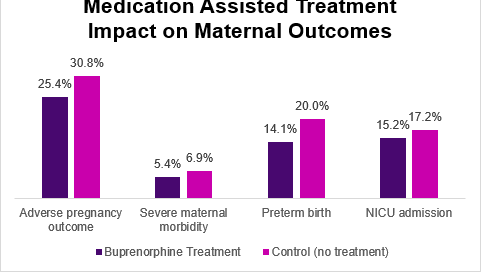Medication assisted treatment for opioid use disorder improves maternal and infant outcomes
May 15, 2025
Summary: Medication assisted treatment improves outcomes for pregnant women and their newborns.
Source: Krishnapura, et al JAMA Health Forum, April 27, 2025
Pregnancy outcomes are worse when mothers have opioid use disorder (OUD). Opioid use disorder is common - affecting about 3.5% of women of childbearing age, Pregnant women with OUD can have overdoses and withdrawal, and are at risk of infections. Babies of mothers with OUD are at risk for neonatal withdrawal, intrauterine growth restriction, stillbirth and death. Nonetheless, almost half of women (44%) who have opioid use disorder during pregnancy do not receive medication assisted treatment (MAT) during their pregnancies.
Researchers retrospectively reviewed pregnancy outcomes of almost 15,000 mothers and babies who were insured through Tennessee Medicaid from 2010 to 2021, comparing the outcomes of women who were treated with buprenorphine (Suboxone) and those who were not. This research was published in JAMA Health Forum. The researchers statistically adjusted results to make the groups more comparable, but this is an observational study so does not prove causality.
Implications for employers:
Improving access to MAT can help improve pregnancy outcomes for mothers and babies. Employers can check with their carriers about what they are doing to be sure that pregnant patients have access to appropriate substance use disorder treatment.
Employers can ask their carriers about efforts to increase access to MAT.
Nonpunitive approaches to drug use can increase the likelihood that women with opioid use disorder seek treatment.
Thanks for reading. You can find previous posts in the Employer Coverage archive
Please subscribe, “like” share this newsletter with friends and colleagues. Thanks!
Tomorrow: Shorts and follow ups.



